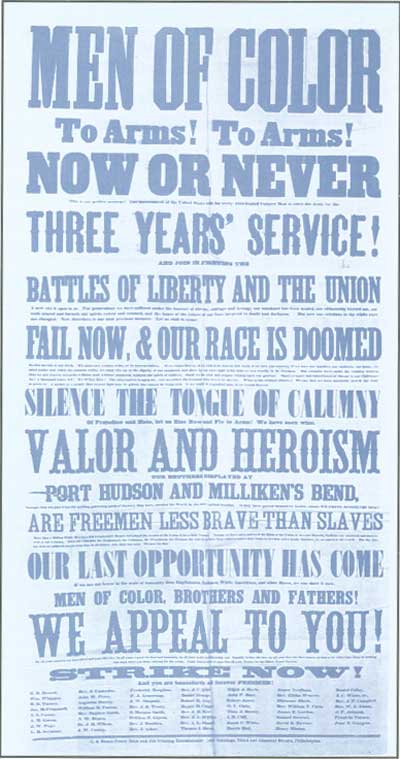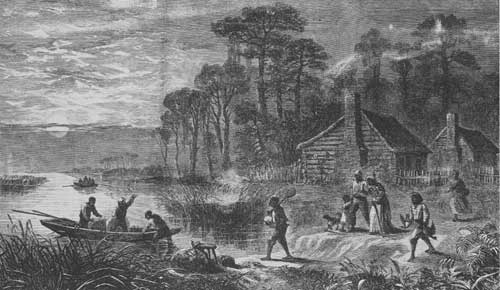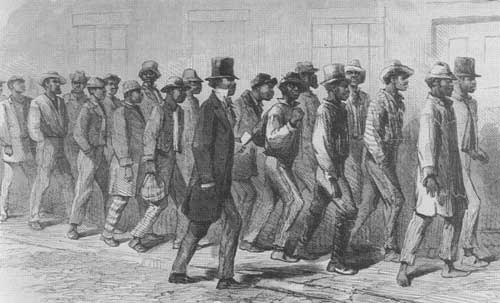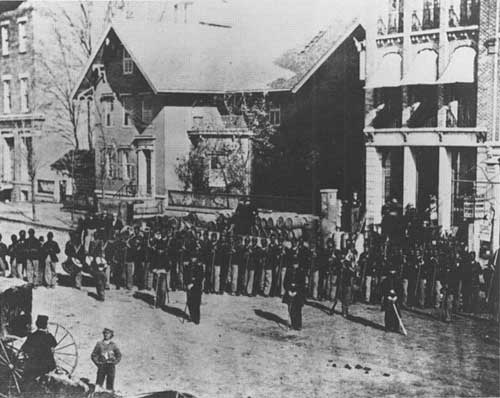|
RECRUITMENT OF BLACK SOLDIERS
Like its officer selection, the means of obtaining enlisted men
differed markedly from that of white commands. Racial prejudice and the
institution of slavery created a host of problems, which forced whites
to alter their methods of recruiting black soldiers. The more simple
process for white units consisted of a call to arms, local enlistment
quotas, the hiring of substitutes, and the threat and stigma of
conscription. Those steps were merely a piece of the recruitment puzzle
for the USCT.
In the North, nearly all black people supported military service. The
Federal government had little trouble convincing men of African descent
to enlist. They viewed the war as a golden opportunity to crush the
institution of slavery, to stand on the same level and in the same
uniform as the white man, and to dispel the oppressive notions of
prejudice that haunted the black population.

|
A RECRUITING POSTER URGING MEN OF COLOR TO ENLIST. (LIBRARY COMPANY OF
PHILADELPHIA)
|
The major problem of black recruitment in the Union was the hostile
white population. Arguments of a white man's war and beliefs in black
inferiority pervaded Northern white society. Neither white soldiers nor
white citizens wanted black soldiers fighting alongside them. But the
realities of war compelled reconsideration. Those whites in uniform
realized that they needed more men in arms. They preferred whites, but
black soldiers were better than nothing. At least black troops could
perform the drudgery of combat support—digging ditches, building
fortifications, driving wagons, and laboring as stevedores—to free
white men for combat.
Civilians in selected businesses, too, realized that as whites
shuffled off to war, the North lost valuable workers. Many civic leaders
joined hands with military officials to alter public perceptions of
black military service. They did so, strangely enough, by tapping into
those tightly held racist attitudes. Advertisements for the creation of
new black units not only urged them to enlist, they sometimes explained
why it was in the interest of whites to tolerate and even encourage
black volunteering. Each black man who joined the army kept one white
man from going to war. Black enlistment reduced local manpower quotas
and in numerous instances prevented a draft. It kept skilled white
workers at home, many of whom produced food and materials that aided the
war effort. Thus, in a peculiar way, black recruitment posters drew on
racial prejudice to convince whites to elevate blacks by supporting an
expansion of the USCT. And over time, this novel approach worked.

|
BLACK FAMILIES FLEEING THEIR SOUTHERN HOMES. (LC)
|
Despite the strong commitment of Northern blacks to military service,
their small population base could sustain comparatively few regiments.
The overwhelming number of black soldiers in the Union army, probably
more than 80 percent, came from the seceding states, where almost nine
of every ten black people in prewar America resided. There the
institution of slavery and a hostile white population made black
enlistment both complicated and hazardous.
Slaves who fled to Union lines frequently incurred enormous risks.
For many, flight was a huge gamble. Seldom did they know the exact
location of the Union army, and if they fell into the hands of
Confederate soldiers or citizens, the consequences were grave. Beatings,
whippings, mutilations, and even murder awaited captured runaways. To
avoid detection, they usually traveled by night and hid during the
daylight hours, obtaining food from fellow slaves or foraging as best
they could. Successful fugitives often entered Federal lines utterly
exhausted and famished. With the offer of three meals a day, clothing,
shelter, and pay, enlistment in the army was their only means of
support.

|
BLACK RECRUITS MARCHING IN THE STREETS OF NEW YORK CITY. (FW)
|
Runaways provided recruits in dribbles. A much better means of
gathering enlistees was through campaigning. As Federals penetrated a
region, throngs of slaves fell into Yankee hands or followed the army
back to safety. Within those occupied regions or among the hundreds,
sometimes thousands of bondsmen who used the army as their shield to
freedom, the military could obtain enough males to fill several
regiments. These campaigns offered the added benefit of securing family
members of prospective enlistees. It was no small comfort for a black
soldier to know that while he fought for the destruction of slavery and
reunion, his family was safely ensconced behind Yankee lines.
Eager recruiters greeted freedmen as they entered Federal camps. In
most cases, the individual who supervised the enlistment process would
also serve as the recruit's commanding officer. This checked the worst
abuses. Occasionally an officer would fail to explain clearly how long
the enlistment hitch was or not discuss fully the duties of soldiering
to unsuspecting former slaves. But because this officer would command
that fellow, and perhaps even enter battle with him, it behooved the
officer to treat the black man responsibly. Such was not the case with
some civilian and military recruiters. They either had quotas to meet or
got paid for each man they enlisted and had no particular interest in
the man once he took the oath of service. Many unscrupulous civilian and
military recruiters defrauded them of enlistment bounties lied to them,
and accepted men for service with obvious illnesses, injuries, wounds,
or deformities. These practices infuriated white authorities and left a
bad impression on black enlistees. It took considerable effort on the
part of their officers to break down this animosity toward any white
official.

|
RECENT RECRUITS TO THE 5TH U.S. COLORED INFANTRY GATHER IN OHIO. (OHIO
HISTORICAL SOCIETY)
|
But for black soldiers in general, the initial days of military
service were thrilling moments. For the first time in their lives, they
felt as if they were on the same level as whites. They had stepped
forward in their country's time of need, and the nation accepted them
readily. They would wear the same uniforms, carry the same weapons,
endure the same hardships, and share the same joys as white soldiers.
"Put a United States uniform on his back," noticed one of their
officers, "and the chattel is a man." It uplifted them as
never before. "This was the biggest thing that ever happened in my
life," recalled a former slave. "I felt like a man with a uniform on and
a gun in my hand."
|
|
